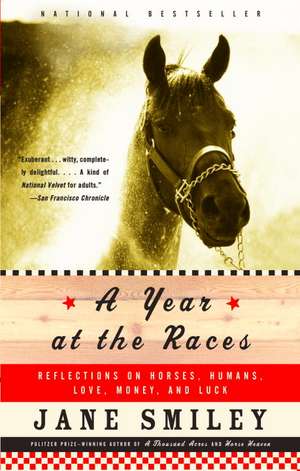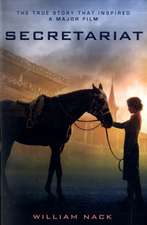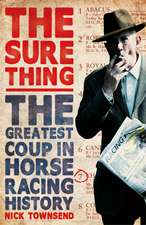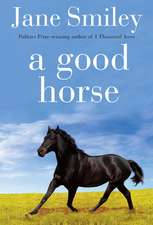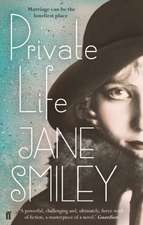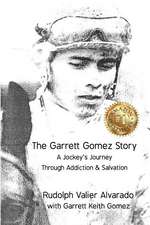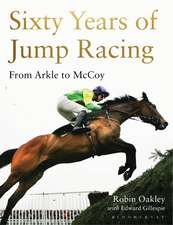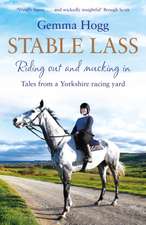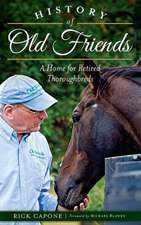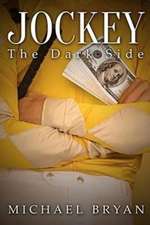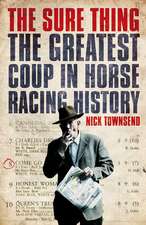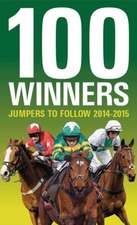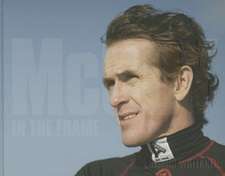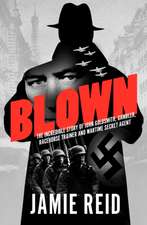A Year at the Races: Reflections on Horses, Humans, Love, Money, and Luck
Autor Jane Smileyen Limba Engleză Paperback – 31 mai 2005
In particular she follows a sexy filly named Waterwheel and a grey named Wowie (he “tells” a horse communicator that he wants it changed from Hornblower) as they begin careers at the racetrack. Filled with humor and suspense, and with discourses on equine intelligence, affection, and character, A Year at the Races is a winner.
Preț: 103.85 lei
Nou
Puncte Express: 156
Preț estimativ în valută:
19.87€ • 20.75$ • 16.41£
19.87€ • 20.75$ • 16.41£
Carte disponibilă
Livrare economică 25 martie-08 aprilie
Preluare comenzi: 021 569.72.76
Specificații
ISBN-13: 9781400033171
ISBN-10: 1400033179
Pagini: 287
Ilustrații: 15 PHOTOGRAPHS
Dimensiuni: 133 x 205 x 16 mm
Greutate: 0.28 kg
Editura: Anchor Books
ISBN-10: 1400033179
Pagini: 287
Ilustrații: 15 PHOTOGRAPHS
Dimensiuni: 133 x 205 x 16 mm
Greutate: 0.28 kg
Editura: Anchor Books
Recenzii
“Exuberant . . . witty, completely delightful. . . . A kind of National Velvet for adults.” –San Francisco Chronicle
“Smiley is arguably America’s foremost author on the subject of love. . . . And love imbues this memoir.” –The Washington Post
“Smiley has flung herself headlong . . . into horse racing. . . . Enough good horse stories to keep any reader happy.” –The New York Times Book Review
“Invigorating . . . thought-provoking. A delightful book filled with arcane horse knowledge. . . . It could easily become the bible of the barn.” –The Baltimore Sun
“Smiley is arguably America’s foremost author on the subject of love. . . . And love imbues this memoir.” –The Washington Post
“Smiley has flung herself headlong . . . into horse racing. . . . Enough good horse stories to keep any reader happy.” –The New York Times Book Review
“Invigorating . . . thought-provoking. A delightful book filled with arcane horse knowledge. . . . It could easily become the bible of the barn.” –The Baltimore Sun
Notă biografică
Jane Smiley is the author of numerous novels, including, most recently, Good Faith, as well as a critically acclaimed biography of Charles Dickens. She is the recipient of a Pulitzer Prize and was inducted into the American Academy of Arts and Letters in 2001. Smiley owns several horses and lives in Northern California.
From the Hardcover edition.
From the Hardcover edition.
Extras
Chapter 1
Two Gals, a Horse, and the Baby Jesus
I was riding in a Manhattan cab downtown, from 48th Street to Hudson Street, and I was talking on my cell phone to my racehorse trainer at Santa Anita. I was not unaware that this was a rather worldly thing to be doing, but we weren't kvelling or counting our millions. We were autopsying the race of the day before, my four-year-old maiden's first race back after a long layoff. He had trembled in the gate ("McCarron said he was shaking like a leaf," said Alexis, not a good sign). "Then, when they came to him, he folded." He had finished second to last; I hadn't seen it, because, after the sixth or seventh race, races from Santa Anita weren't broadcast in OTB shops in Manhattan. I had listened the night before to Alexis's glum report of the race in another cab-heading uptown-alone in the dark, all dolled up for a fund-raiser. Now she said, "The Baby Jesus thinks McCarron's the wrong jockey for him."
"He does? Why?"
"He doesn't push them. If they want to run, he encourages them, but if they don't want to, he doesn't motivate them."
I said, "Who does the Baby Jesus think would be better?"
"Oh, he didn't say. They never do."
I reflected on Chris McCarron, a great jockey, and just the sort of kind, sensitive, tactful rider I wanted my maiden to do best with. I reflected on the Baby Jesus. I said, "Well, ask him, just to see. Just tell the Baby Jesus to close his eyes, put the heel of his hand on his third eye, and come up with a name."
"I'll try it," said Alexis.
"Has the Baby Jesus ever ridden him?"
"Oh, sure. He loves him."
"Well, I think we should just ask the Baby Jesus. Just once."
"Well, anyway," said Alexis, "he came out of the race fine. Ate up every oat and looked for more. His legs are cool and tight. No problems. I just worry about that trembling thing. We'll see. You know, that horse we had, Golden Post, he shook like mad before every race. He was psyching himself up because he didn't have much talent. He really wanted to win. We tried for years to relax him, and the only time he ever went to the post relaxed, he ran last. He won five hundred thousand dollars all in all. You never know with these horses."
I agreed. After all, she had decades of experience, and if she never knew, well, I certainly never, never knew. I thanked her and hung up. We had just turned onto Varick Street. The cabdriver spoke. He had a mellow baritone voice and a rich Middle Eastern accent. He said, "This Baby Jesus you were talking about. Is he the Baby Jesus in the Bible?"
It took me a moment to recall my attention from the sunny environs of Arcadia, California, where I imagined the horses and their riders wafting among the green shedrow barns with their well-tended rose gardens and their horse bandages swaying in the breeze. The weather was pleasant enough in Manhattan, but it was February, and not warm. I envisioned Alexis and Andy and Barry, and, of course, the Baby Jesus, standing in a circle in the golden sunlight, shaking their heads over my maiden's sad performance. I said, "Oh, no. The Baby Jesus is a little Irish exercise rider at a racetrack. He's so little and darling that they nicknamed him the Baby Jesus." As I said this, I wondered if the cabdriver was of a religious persuasion that would cause him to be offended at this idea. I offered, "It's an Irish thing, I think."
The cabdriver looked at me for a moment, then said, "I have a funny name, too." He pointed to his cabbie's license, displayed on the dashboard. It said that his name, his first name, was "Soccer." We laughed together, and I got out of the cab.
To the cabdriver, I may have sounded like I knew something, but in fact I had been racing my horse, whose registered name was "Hornblower," for less than two years, and for ten months of that he had vacationed at a farm in the country, recovering from an injury that was tiny but might have gotten serious without several months off. The horse was a gray colt of humble breeding but much beauty and grace, with a big, fluid stride. The adjective often used to describe him was "promising." He was my first horse to get to the track.
He lived at Santa Anita Racetrack, in a stall in a moss-green shedrow barn. The barns at Santa Anita are board-and-batten, old, but roomy and well kept. The paths are raked neatly every day. By the end of morning exercise, everything is so quiet, balmy, and neat that you wouldn't even know that horses live there, except for their heads peering over stall doors, or their hay nets hanging within easy reach. Citation lived here once, as did Seabiscuit. Tiznow, who won the Breeders' Cup twice, lived here until a few months ago. Silver Charm, Real Quiet, Fusaichi Pegasus, and Charismatic walked to the track just like Hornblower does every day. Like these great horses, my horse is perfectly cared for and perfectly fit. It is possible that every day, somewhere on the backside or on the track, Hornblower encounters the horse that will win this year's Kentucky Derby. He himself is too old for the Derby, since he is four, but, like him, all the horses are incognito-what their futures hold, what they can do and will do, is secret from their trainers and riders, though perhaps not quite so secret to the horses themselves.
The "backside" of a racetrack is where the horses are maintained. At Santa Anita, it is really the "leftside"-hidden behind high hedges to the left of the main parking lot (at Hollywood Park and Del Mar, it is more traditionally located across the track from the grandstand; and at Bay Meadows, outside of San Francisco, it was recently relocated to the infield of the track, after the land was sold off to condo developers). The backside is a world apart within the larger world apart of horseracing. It is where trainers, assistant trainers, exercise riders, jockeys, veterinarians, and farriers work every day, sometimes for forty or fifty years, and it is where grooms and hot-walkers live as well as work. Passions may run high on the backside, as they do in any workplace, but the atmosphere is tranquil because of the horses, who like routine and reassurance. Trainers like their horses to be happy and relaxed. But horsemen have secrets, too. If, as psychologists like to assert, human society is primarily a vast set of overlapping and interlocking stories, then backside society is
a concentrated version, where almost all conversation is the telling of tales, the keeping and divining of secrets.
Hornblower was a "maiden," a horse that has never won a race. Like "backside," this word is a typical horse-lore double entendre, and a perfect example of the covert sexuality of the English of horseracing and of the horse world in general.* A maiden is a modern representative of untried youth, a maghu in Indo-European. And of course he is a virgin, and of course, as a stallion, he is a little bit suspect. Male horses at the racetrack don't get to stay stallions for long if they don't win races. And so I was beginning to feel rather protective of my maiden's cojones. Now that he had started again, after his layoff, and had done poorly, and had trembled, and had not responded to the master hand of Chris McCarron, the inevitable pressure to castrate was going to build. One English term, not current in America, for a tool used to castrate horses is "scrungers."* I had to admit I recoiled from the idea of having my maiden scrunged.
There were two reasons not to cut him. One was that he always behaved perfectly. He didn't bite or strike or squeal or act aggressive around fillies (a word for young female horses, which, appropriately, comes from the French). The other was that he was breathtakingly beautiful. My maiden had excellent conformation. He was built to stand and to move stably and efficiently. All horses have conformation, which is not beauty but mechanical usefulness: Are the horse's parts put together so that they will function and last? Do his legs have the proper angles? Does his head meet his neck in a manner that promotes balance and flexibility? Is his front end (chest, shoulders) balanced in size and power with his back end (hips and buttocks)? And so forth. Horse conformation is as much about architecture or engineering as aesthetics. But in addition to this, he was put together with exceptional grace. His shape, his lines, his demeanor all came together in unnecessarily gorgeous ways-the curve of his ears, the lift of his tail, his color of dark, dappled gray, the large size of his eye, and the classic etched refinement of his profile. A man I know, not only an experienced horseman but also a skeptical one, told me, "You are to be commended for breeding such a specimen." And the horse had been a beautiful specimen since the day he was born. He came out of the womb with muscle tone, presence of mind, and self-confidence. I didn't want to cut him because I wanted to breed him to my own mares, to upgrade their imperfections, not merely because I had a studbook fantasy, which I of course also had.
I was exhibiting distinct signs of owneritis, the disease of loving your worthy but, let's admit it, mediocre horse too much. However, there is the universal recognition that scrunging (more commonly known as gelding*) is an irreversible operation, and even its most resolute proponents are subject to a degree of visceral hesitation, which I was exploiting to the full. Alexis wasn't yet insisting on gelding him, she was only floating the idea from time to time, because every gelding works out differently-often the new gelding concentrates less on fillies and more on racing, and so betters his record and wins more money, but sometimes the new gelding loses the competitive edge altogether. Much depended on what sort of theory we came up with to account for the trembling.
Counterbalancing the trembling was the appetite. If the race had been so traumatic for him, he wouldn't have eaten so heartily right afterward. The trembling was maybe excitement rather than nerves? We could use lots of phrases-keyed up, charged up, psyched up-that made the trembling into something strong rather than weak. On the other hand, the acknowledged expert, McCarron, intuitively understood the trembling as fear.
I was blue. Alexis was blue. No infusion of funds, no fulfillment of fantasy, no relief from the burden of supporting the horse at the track, which costs about as much as a Harvard
education. The horse continued his daily routine as if he had never exerted himself-he was sound and enthusiastic and well behaved. He began to seem a little enigmatic. I consulted a horse-astrology site online.
In the catalogue of superstitious rituals that racing people resort to in order to come up with a winner, I personally think that consulting a horse-astrology site is practically mainstream, which did not mean that I confided what I learned in those around me. The site was Australian, which was once again interesting-Aussies are hard-nosed and sunburnt and forthright, but there is an ill-concealed vein of romantic fervor there, especially when it comes to horses. They preserve the skeleton of Phar Lap, for example, the greatest racehorse of the Southern Hemisphere, in one place, and his hide in another. They preserve the notion that he was murdered by the Americans, though probably he only died of colic. This is not to say that I am unsympathetic to Australian ideas about horses-rather, that I am relieved that someone has a horse-astrology Web site, and that I'm not surprised that it is Australian.
The news under "Pisces" was not encouraging. The operative words were "sensitive, impressionable, and a dreamer." Additionally, there was "very gentle nature." Normally, successful racehorses are not known for gentle natures. Alexis, in fact, has a picture in her office of one of the best horses she has ever trained (or helped train-at the time she was the assistant trainer for Eddie Gregson). His name was Super Diamond (changed at Eddie's insistence from "Super Chicken"). In the picture, he is pinning his ears and trying to bite the passerby with cobralike viciousness and speed. Whenever I happened to ask her about Super Diamond, who won over a million dollars, she would laugh affectionately and say, "Oh, he was a son of a bitch! He'd do anything to get you! He was great!"
There was more in the astrological description about Pisces horses' taking a larger, more evolved perspective on things. I felt that my maiden could ill afford to take a larger perspective before he had won a few races. I thought about alternative careers that might require a larger perspective, though I couldn't come up with one other than his being a stud and commanding a small band of mares, patrolling the perimeter, planting the seeds of future generations, etc. The bar to a larger perspective in the future remained learning how to take a smaller, more focused perspective now.
He was my only Pisces, and I didn't like what I read, so I was tempted to discount the astrologer's opinion, except that the descriptions under the other signs did ring true. My Aries horse was active, bossy, dominating. My Taurus horses were comfortable in the herd, steady, very food-oriented, tending to be balky sometimes. My Gemini horse was unusually friendly. If I came to the gate when she was eating her hay, she would nicker and walk over to me every time, even when the others kept feeding.
Perhaps my maiden's problem was to be found, literally, in his conception. When I sent his dam to his sire, I wasn't interested in racing, I was interested in three-day eventing. I had hoped to produce a tough, good staying-and-jumping horse for my own use. It was only after he was born, when I was working on my novel Horse Heaven, that I'd seen what a fine specimen he was and considered sending him to the track. It was not only his muscle tone, mysteriously well developed for a newborn foal, so that he was up and cantering around his stall within a half an hour of birth, even though one of his feet was bent from his position in the womb and he could touch only the toe of that foot to the ground. It was not only his stride, which was long and liquid from the first. It was more the look on his face, which was serious.
From the Hardcover edition.
Two Gals, a Horse, and the Baby Jesus
I was riding in a Manhattan cab downtown, from 48th Street to Hudson Street, and I was talking on my cell phone to my racehorse trainer at Santa Anita. I was not unaware that this was a rather worldly thing to be doing, but we weren't kvelling or counting our millions. We were autopsying the race of the day before, my four-year-old maiden's first race back after a long layoff. He had trembled in the gate ("McCarron said he was shaking like a leaf," said Alexis, not a good sign). "Then, when they came to him, he folded." He had finished second to last; I hadn't seen it, because, after the sixth or seventh race, races from Santa Anita weren't broadcast in OTB shops in Manhattan. I had listened the night before to Alexis's glum report of the race in another cab-heading uptown-alone in the dark, all dolled up for a fund-raiser. Now she said, "The Baby Jesus thinks McCarron's the wrong jockey for him."
"He does? Why?"
"He doesn't push them. If they want to run, he encourages them, but if they don't want to, he doesn't motivate them."
I said, "Who does the Baby Jesus think would be better?"
"Oh, he didn't say. They never do."
I reflected on Chris McCarron, a great jockey, and just the sort of kind, sensitive, tactful rider I wanted my maiden to do best with. I reflected on the Baby Jesus. I said, "Well, ask him, just to see. Just tell the Baby Jesus to close his eyes, put the heel of his hand on his third eye, and come up with a name."
"I'll try it," said Alexis.
"Has the Baby Jesus ever ridden him?"
"Oh, sure. He loves him."
"Well, I think we should just ask the Baby Jesus. Just once."
"Well, anyway," said Alexis, "he came out of the race fine. Ate up every oat and looked for more. His legs are cool and tight. No problems. I just worry about that trembling thing. We'll see. You know, that horse we had, Golden Post, he shook like mad before every race. He was psyching himself up because he didn't have much talent. He really wanted to win. We tried for years to relax him, and the only time he ever went to the post relaxed, he ran last. He won five hundred thousand dollars all in all. You never know with these horses."
I agreed. After all, she had decades of experience, and if she never knew, well, I certainly never, never knew. I thanked her and hung up. We had just turned onto Varick Street. The cabdriver spoke. He had a mellow baritone voice and a rich Middle Eastern accent. He said, "This Baby Jesus you were talking about. Is he the Baby Jesus in the Bible?"
It took me a moment to recall my attention from the sunny environs of Arcadia, California, where I imagined the horses and their riders wafting among the green shedrow barns with their well-tended rose gardens and their horse bandages swaying in the breeze. The weather was pleasant enough in Manhattan, but it was February, and not warm. I envisioned Alexis and Andy and Barry, and, of course, the Baby Jesus, standing in a circle in the golden sunlight, shaking their heads over my maiden's sad performance. I said, "Oh, no. The Baby Jesus is a little Irish exercise rider at a racetrack. He's so little and darling that they nicknamed him the Baby Jesus." As I said this, I wondered if the cabdriver was of a religious persuasion that would cause him to be offended at this idea. I offered, "It's an Irish thing, I think."
The cabdriver looked at me for a moment, then said, "I have a funny name, too." He pointed to his cabbie's license, displayed on the dashboard. It said that his name, his first name, was "Soccer." We laughed together, and I got out of the cab.
To the cabdriver, I may have sounded like I knew something, but in fact I had been racing my horse, whose registered name was "Hornblower," for less than two years, and for ten months of that he had vacationed at a farm in the country, recovering from an injury that was tiny but might have gotten serious without several months off. The horse was a gray colt of humble breeding but much beauty and grace, with a big, fluid stride. The adjective often used to describe him was "promising." He was my first horse to get to the track.
He lived at Santa Anita Racetrack, in a stall in a moss-green shedrow barn. The barns at Santa Anita are board-and-batten, old, but roomy and well kept. The paths are raked neatly every day. By the end of morning exercise, everything is so quiet, balmy, and neat that you wouldn't even know that horses live there, except for their heads peering over stall doors, or their hay nets hanging within easy reach. Citation lived here once, as did Seabiscuit. Tiznow, who won the Breeders' Cup twice, lived here until a few months ago. Silver Charm, Real Quiet, Fusaichi Pegasus, and Charismatic walked to the track just like Hornblower does every day. Like these great horses, my horse is perfectly cared for and perfectly fit. It is possible that every day, somewhere on the backside or on the track, Hornblower encounters the horse that will win this year's Kentucky Derby. He himself is too old for the Derby, since he is four, but, like him, all the horses are incognito-what their futures hold, what they can do and will do, is secret from their trainers and riders, though perhaps not quite so secret to the horses themselves.
The "backside" of a racetrack is where the horses are maintained. At Santa Anita, it is really the "leftside"-hidden behind high hedges to the left of the main parking lot (at Hollywood Park and Del Mar, it is more traditionally located across the track from the grandstand; and at Bay Meadows, outside of San Francisco, it was recently relocated to the infield of the track, after the land was sold off to condo developers). The backside is a world apart within the larger world apart of horseracing. It is where trainers, assistant trainers, exercise riders, jockeys, veterinarians, and farriers work every day, sometimes for forty or fifty years, and it is where grooms and hot-walkers live as well as work. Passions may run high on the backside, as they do in any workplace, but the atmosphere is tranquil because of the horses, who like routine and reassurance. Trainers like their horses to be happy and relaxed. But horsemen have secrets, too. If, as psychologists like to assert, human society is primarily a vast set of overlapping and interlocking stories, then backside society is
a concentrated version, where almost all conversation is the telling of tales, the keeping and divining of secrets.
Hornblower was a "maiden," a horse that has never won a race. Like "backside," this word is a typical horse-lore double entendre, and a perfect example of the covert sexuality of the English of horseracing and of the horse world in general.* A maiden is a modern representative of untried youth, a maghu in Indo-European. And of course he is a virgin, and of course, as a stallion, he is a little bit suspect. Male horses at the racetrack don't get to stay stallions for long if they don't win races. And so I was beginning to feel rather protective of my maiden's cojones. Now that he had started again, after his layoff, and had done poorly, and had trembled, and had not responded to the master hand of Chris McCarron, the inevitable pressure to castrate was going to build. One English term, not current in America, for a tool used to castrate horses is "scrungers."* I had to admit I recoiled from the idea of having my maiden scrunged.
There were two reasons not to cut him. One was that he always behaved perfectly. He didn't bite or strike or squeal or act aggressive around fillies (a word for young female horses, which, appropriately, comes from the French). The other was that he was breathtakingly beautiful. My maiden had excellent conformation. He was built to stand and to move stably and efficiently. All horses have conformation, which is not beauty but mechanical usefulness: Are the horse's parts put together so that they will function and last? Do his legs have the proper angles? Does his head meet his neck in a manner that promotes balance and flexibility? Is his front end (chest, shoulders) balanced in size and power with his back end (hips and buttocks)? And so forth. Horse conformation is as much about architecture or engineering as aesthetics. But in addition to this, he was put together with exceptional grace. His shape, his lines, his demeanor all came together in unnecessarily gorgeous ways-the curve of his ears, the lift of his tail, his color of dark, dappled gray, the large size of his eye, and the classic etched refinement of his profile. A man I know, not only an experienced horseman but also a skeptical one, told me, "You are to be commended for breeding such a specimen." And the horse had been a beautiful specimen since the day he was born. He came out of the womb with muscle tone, presence of mind, and self-confidence. I didn't want to cut him because I wanted to breed him to my own mares, to upgrade their imperfections, not merely because I had a studbook fantasy, which I of course also had.
I was exhibiting distinct signs of owneritis, the disease of loving your worthy but, let's admit it, mediocre horse too much. However, there is the universal recognition that scrunging (more commonly known as gelding*) is an irreversible operation, and even its most resolute proponents are subject to a degree of visceral hesitation, which I was exploiting to the full. Alexis wasn't yet insisting on gelding him, she was only floating the idea from time to time, because every gelding works out differently-often the new gelding concentrates less on fillies and more on racing, and so betters his record and wins more money, but sometimes the new gelding loses the competitive edge altogether. Much depended on what sort of theory we came up with to account for the trembling.
Counterbalancing the trembling was the appetite. If the race had been so traumatic for him, he wouldn't have eaten so heartily right afterward. The trembling was maybe excitement rather than nerves? We could use lots of phrases-keyed up, charged up, psyched up-that made the trembling into something strong rather than weak. On the other hand, the acknowledged expert, McCarron, intuitively understood the trembling as fear.
I was blue. Alexis was blue. No infusion of funds, no fulfillment of fantasy, no relief from the burden of supporting the horse at the track, which costs about as much as a Harvard
education. The horse continued his daily routine as if he had never exerted himself-he was sound and enthusiastic and well behaved. He began to seem a little enigmatic. I consulted a horse-astrology site online.
In the catalogue of superstitious rituals that racing people resort to in order to come up with a winner, I personally think that consulting a horse-astrology site is practically mainstream, which did not mean that I confided what I learned in those around me. The site was Australian, which was once again interesting-Aussies are hard-nosed and sunburnt and forthright, but there is an ill-concealed vein of romantic fervor there, especially when it comes to horses. They preserve the skeleton of Phar Lap, for example, the greatest racehorse of the Southern Hemisphere, in one place, and his hide in another. They preserve the notion that he was murdered by the Americans, though probably he only died of colic. This is not to say that I am unsympathetic to Australian ideas about horses-rather, that I am relieved that someone has a horse-astrology Web site, and that I'm not surprised that it is Australian.
The news under "Pisces" was not encouraging. The operative words were "sensitive, impressionable, and a dreamer." Additionally, there was "very gentle nature." Normally, successful racehorses are not known for gentle natures. Alexis, in fact, has a picture in her office of one of the best horses she has ever trained (or helped train-at the time she was the assistant trainer for Eddie Gregson). His name was Super Diamond (changed at Eddie's insistence from "Super Chicken"). In the picture, he is pinning his ears and trying to bite the passerby with cobralike viciousness and speed. Whenever I happened to ask her about Super Diamond, who won over a million dollars, she would laugh affectionately and say, "Oh, he was a son of a bitch! He'd do anything to get you! He was great!"
There was more in the astrological description about Pisces horses' taking a larger, more evolved perspective on things. I felt that my maiden could ill afford to take a larger perspective before he had won a few races. I thought about alternative careers that might require a larger perspective, though I couldn't come up with one other than his being a stud and commanding a small band of mares, patrolling the perimeter, planting the seeds of future generations, etc. The bar to a larger perspective in the future remained learning how to take a smaller, more focused perspective now.
He was my only Pisces, and I didn't like what I read, so I was tempted to discount the astrologer's opinion, except that the descriptions under the other signs did ring true. My Aries horse was active, bossy, dominating. My Taurus horses were comfortable in the herd, steady, very food-oriented, tending to be balky sometimes. My Gemini horse was unusually friendly. If I came to the gate when she was eating her hay, she would nicker and walk over to me every time, even when the others kept feeding.
Perhaps my maiden's problem was to be found, literally, in his conception. When I sent his dam to his sire, I wasn't interested in racing, I was interested in three-day eventing. I had hoped to produce a tough, good staying-and-jumping horse for my own use. It was only after he was born, when I was working on my novel Horse Heaven, that I'd seen what a fine specimen he was and considered sending him to the track. It was not only his muscle tone, mysteriously well developed for a newborn foal, so that he was up and cantering around his stall within a half an hour of birth, even though one of his feet was bent from his position in the womb and he could touch only the toe of that foot to the ground. It was not only his stride, which was long and liquid from the first. It was more the look on his face, which was serious.
From the Hardcover edition.
Descriere
A Pulitzer-winning author presents a charming, funny, and a bit outrageous exploration of the abiding bond between humans and horses, told with panache, intelligence, and humor.
